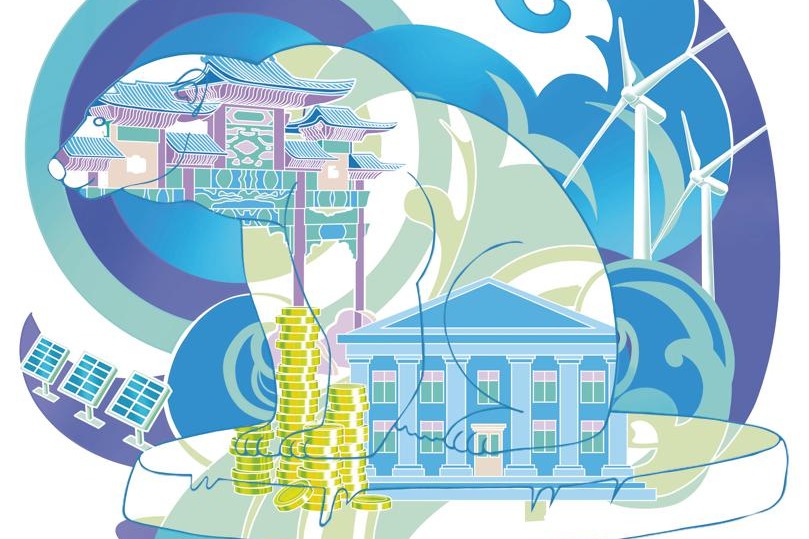What to expect from China's new round of reforms?


China's economic performance has long been making headlines in the international media. And why wouldn't it be? Even the slightest change in China's economy can spark various speculations worldwide. After all, China is the top trading partner for over 140 countries and has contributed over 30 percent to global economic growth for more than a decade. Therefore, it is understandable that the recently concluded third plenary session of the 20th CPC Central Committee, with the theme of deepening economic reform, has become a global focal point.
However, when reading the comments on the plenary session made by some renowned financial media outlets, such as the UK's Financial Times, the US's Wall Street Journal and Japan's Sankei Shimbun, one can be quite puzzled. They used many technical jargons only to conclude that the plenary session failed to roll out major stimulus policies or policies bearing on the future direction of reforms, that it will not significantly benefit China's economy, and that the prospects of China's economy remain dim. Such rhetoric is full of political bias and deliberate misinformation, as it lacks basic common sense.
China's economic growth rate is much higher than that of other major economies in the world. From 2021 to 2023, China achieved an average annual growth rate of more than 5 percent, with an average annual economic expansion of nearly US$1 trillion, equivalent to the economic aggregate of a medium-sized country. China's GDP in 2024 is projected to grow by 5 percent again, higher than the projected global growth rate of 2.9 percent and the projected growth rate of 1.4 percent for developed economies. Some international media outlets pointed out that China's economy faces structural challenges, such as demographic change, debt problems, and insufficient effective demand, etc. But China is not unique in this regard, as all economies are beset by problems of this and that kind. Maintaining a growth rate of over 5 percent is already enviable for most countries. After all, the United States, which has long claimed to have a super-strong economic performance, only saw its economy grow by 2.5 percent in 2023.
What about the comment about "no directional reforms or major stimulus policies from the plenary session"? One must understand that China has all along adhered to the fundamental policy direction of reform and opening up since it was adopted at the third plenary session of the 11th CPC Central Committee in 1978, while making incremental adjustments to address issues arising at different stages within this overarching framework. It is fair to say that China's progress along this path is widely acknowledged, without any need to change the general direction of reforms or adopt strong stimulus policies that might provide short-term relief but produce negative consequences in the long run. The Chinese government has set the goals of comprehensively deepening reforms this time: to gather fresh impetus and provide more robust institutional support for maintaining comprehensive and healthy development over the next decade and accelerating the building of a modern country. There is a strong view that China will focus more on reform, better leverage market mechanisms, maintain market order, steadily expand domestic demand, foster new quality productive forces in line with local conditions, redouble its efforts towards high-quality development, and open its door wider to the outside world.
All reforms since the beginning of reform and opening up in 1978 have been future-oriented and aimed to address various institutional and structural problems. Each round of reform has indeed reinvigorated China's economy with new vitality, which is a key reason for China's exceptional performance over the decades. Given the sheer size of the Chinese economy and its sound momentum, moderate reform measures are strong enough to firm up confidence in the prospect that China’s consumer market will continue to expand and upgrade, its technological innovation will accelerate, and the vitality of the Chinese economy will be further stimulated. During the 2013-2021 period, China's contribution to global economic growth averaged 35.3 percent, higher than that of the G7 countries combined. Bloomberg predicts that China will be the top contributor to global growth over the next five years. With the introduction and implementation of reform measures announced at the third plenary session of the 20th CPC Central Committee, we are confident in the forecast.
According to the IMF estimates, a one percentage point increase in Chinese growth leads to a 0.3 percentage point increase in both the Asian and global economies. For Global South countries, China is the most enthusiastic to engage in cooperation without attaching any political strings, and is the major country most actively supporting and facilitating the industrial development and technological progress of these countries. That's why Global South countries closely follow China's economic performance and sincerely hope that China will continue to maintain comprehensive and steady development. Despite the pessimistic views from the Western media, we have ample reasons to be confident about China’s economic prospects and are prepared to board the "express train" of China's development to achieve common growth through expanded cooperation.


































